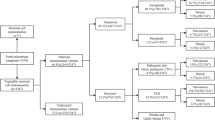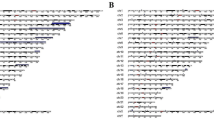Abstract
Aneuploidies, such as Down syndrome (DS), are the leading cause of pregnancy loss. Abnormalities in aurora kinase proteins result in genomic instability and aneuploidy, mainly in tumors. Thus, polymorphisms in Aurora kinase genes could influence the occurrence of DS and spontaneous abortion. A case-control study was conducted including 124 mothers of DS children (DSM) and 219 control mothers (CM) to investigate DS risk according to AURKA and AURKC polymorphisms. Genotyping was performed using TaqMan real-time PCR. The minor allele frequency (MAF) observed in AURKA rs2273535 was, respectively, 0.23 in DSM and 0.20 in CM, whereas the frequency of the AURKC rs758099 T allele was 0.32 in case and 0.33 in control mothers. Statistical analysis showed no significant difference in the distribution of genotypes and allele frequencies between DSM and CM. According to previous history of spontaneous abortion, the AURKA rs2273535 genotypes (TT + AT vs. AA: OR 2.54, 95% CI 1.13–5.71, p = 0.02; AT vs. AA: OR 2.39, 95% CI 1.03–5.51, p = 0.04; T vs. A: OR 2.08, 95% CI 1.12–3.90, p = 0.02) and AURKC rs758099 (TT vs. CC: OR 4.34, 95% CI 1.03–18.02, p = 0.04; TT + CT vs. CC: OR 2.52, 95% CI 1.02–6.23, p = 0.04; T vs. C: OR 2.03, 95% CI 1.09–3.80, p = 0.02) were observed as risk factors for spontaneous abortion in case mothers. Our study suggests a possible relationship between AURKA/AURKC variants and increased risk of spontaneous abortion within Down syndrome mothers.
Similar content being viewed by others
References
Hassold T, Hunt P. To err (meiotically) is human: The genesis of human aneuploidy. Nat Rev Genet. 2001;2:280–91.
Nagaoka SI, Hassold TJ, Hunt PA. Human aneuploidy: mechanisms and new insights into an age-old problem. Nat Rev Genet. 2012;13(7):493–504.
Sherman SL, Allen EG, Bean LH, Freeman SB. Epidemiology of down syndrome. Ment Retard Dev Disabil. 2007;13(3):221–7.
Hassold T, Chiu D. Maternal age-specific rates of numerical chromosome abnormalities with special reference to trisomy. Hum Genet. 1985;70(1):11–7.
Mikwar M, MacFarlane AJ, Marchetti F. Mechanisms of oocyte aneuploidy associated with advanced maternal age. Mutat Res Rev Mutat Res. 2020;785:108320.
Chernus JM, Sherman SL, Feingold E. Analyses stratified by maternal age and recombination further characterize genes associated with maternal nondisjunction of chromosome 21. Prenatal Diag. 2021;41(5):591–609.
Carmena M, Earnshaw WC. The cellular geography of Aurora kinases. Nat Rev Mol Cell Biol. 2003;4(11):842–54.
Anand S, Penrhyn-Lowe S, Venkitaraman AR. AURORA-A amplification overrides the mitotic spindle assembly checkpoint, inducing resistance to Taxol. Cancer Cell. 2003;3(1):51–62.
Nikonova AS, Astsaturov I, Serebriiskii IG, Dunbrack RL, Golemis EA. Aurora A kinase (AURKA) in normal and pathological cell division. Cell Mol Life Sci. 2013;70(4):661–87.
Willems E, Dedobbeleer M, Digregorio M, Lombard A, Lumapat PN, Rogister B. The functional diversity of Aurora kinases: a comprehensive review. Cell Div. 2018;13:7.
Nguyen AL, Schindler K. Specialize and divide (Twice): functions of three aurora kinase homologs in mammalian oocyte meiotic maturation. Trends Genet. 2017;33(5):349–63.
Fernández-Miranda G, Trakala M, Martín J, Escobar B, González A, Ghyselinck NB, et al. Genetic disruption of aurora B uncovers an essential role for aurora C during early mammalian development. Development. 2011;138(13):2661–72.
Dieterich K, Soto Rifo R, Karen Faure A, Hennebicq S, Amar BB, Zahi M, et al. Homozygous mutation of AURKC yields large-headed polyploid spermatozoa and causes male infertility. Nat Genet. 2007;39(5):661–5.
Ewart-Toland A, Briassouli P, De Koning JP, Mao JH, Yuan J, Chan F, et al. Identification of Stk6/STK15 as a candidate low-penetrance tumor-susceptibility gene in mouse and human. Nat Genet. 2003;34(4):403–12.
Ruan Y, Song AP, Wang H, Xie YT, Han JY, Sajdik C, et al. Genetic polymorphisms in AURKA and BRCA1 are associated with breast cancer susceptibility in a Chinese Han population. J Pathol. 2011;225(4):535–43.
Mesic A, Rogar M, Hudler P, Juvan R, Komel R. Association of the AURKA and AURKC gene polymorphisms with an increased risk of gastric cancer. IUBMB Life. 2016;68(8):634–44.
Barboza HN, Aprigio J, Araujo CF, Ribeiro MG, Costa-Lima MA, Quirico-Santos T, et al. Efficient DNA extraction protocol for single nucleotide polymorphisms genotyping in down syndrome. J Down Syndr Chromosom Abnorm. 2016;2(2):2–5.
Loane M, Morris JK, Addor MC, Arriola L, Budd J, Doray B, et al. Twenty-year trends in the prevalence of Down syndrome and other trisomies in Europe: Impact of maternal age and prenatal screening. Eur J Hum Genet. 2013;21(1):27–33.
Thompson JA. Disentangling the roles of maternal and paternal age on birth prevalence of down syndrome and other chromosomal disorders using a Bayesian modeling approach. BMC Med Res Methodol. 2019;19(1):82.
Tchatchou S, Wirtenberger M, Hemminki K, Sutter C, Meindl A, Wappenschmidt B, et al. Aurora kinases A and B and familial breast cancer risk. Cancer Lett. 2007;247(2):266–72.
Zhou X, Wang P, Zhao H. The association between AURKA gene rs2273535 polymorphism and gastric cancer risk in a Chinese population. Front Physiol. 2018;9:1124.
Gibbs RA, Boerwinkle E, Doddapaneni H, Han Y, Korchina V, Kovar C, et al. A global reference for human genetic variation. Nature. 2015;526(7571):68–74.
Zhou H, Kuang J, Zhong L, Kuo WL, Gray JW, Sahin A, et al. Tumour amplified kinase STK15/BTAK induces centrosome amplification, aneuploidy and transformation. Nat Genet. 1998;20(2):189–93.
Baba Y, Nosho K, Shima K, Irahara N, Kure S, Toyoda S, et al. Aurora-A expression is independently associated with chromosomal instability in colorectal cancer. Neoplasia. 2009;11(5):418–25.
Ertych N, Stolz A, Stenzinger A, Weichert W, Kaulfuß S, Burfeind P, et al. Increased microtubule assembly rates influence chromosomal instability in colorectal cancer cells. Nat Cell Biol. 2014;16(8):779–91.
Bury L, Coelho PA, Simeone A, Ferries S, Eyers CE, Eyers PA, et al. Plk4 and Aurora A cooperate in the initiation of acentriolar spindle assembly in mammalian oocytes. J Cell Biol. 2017;216(11):3571–90.
So C, Seres KB, Steyer AM, Mönnich E, Clift D, Pejkovska A, et al. A liquid-like spindle domain promotes acentrosomal spindle assembly in mammalian oocytes. Science. 2019;364(6447):eaat9557.
Saskova A, Solc P, Baran V, Kubelka M, Schultz RM, Motlik J. Aurora kinase a controls meiosis I progression in mouse oocytes. Cell Cycle. 2008;7(15):2368–76.
Kimura MT, Mori T, Conroy J, Nowak NJ, Satomi S, Tamai K, et al. Two functional coding single nucleotide polymorphisms in STK15 (Aurora-A) coordinately increase esophageal cancer risk. Cancer Res. 2005;65(9):3548–54.
Nguyen AL, Drutovic D, Vazquez BN, El Yakoubi W, Gentilello AS, Malumbres M, et al. Genetic interactions between the aurora kinases reveal new requirements for AURKB and AURKC during oocyte meiosis. Curr Biol. 2018;28(21):3458-3468.e5. https://doi.org/10.1016/j.cub.2018.08.052.
Blengini CS, Ibrahimian P, Vaskovicova M, Drutovic D, Solc P, Schindler K. Aurora kinase A is essential for meiosis in mouse oocytes. PLoS Genet. 2021;17(4):e1009327. https://doi.org/10.1371/journal.pgen.1009327.
Schindler K, Davydenko O, Fram B, Lampson MA, Schultz RM. Maternally recruited Aurora C kinase is more stable than Aurora B to support mouse oocyte maturation and early development. Proc Natl Acad Sci USA. 2012;109(33):E2215–22.
Balboula AZ, Schindler K. Selective disruption of Aurora c kinase reveals distinct functions from Aurora B kinase during meiosis in mouse oocytes. PLoS Genet. 2014;10(2):e1004194. https://doi.org/10.1371/journal.pgen.1004194.
Cowley DO, Rivera-Pérez JA, Schliekelman M, He YJ, Oliver TG, Lu L, et al. Aurora-A kinase is essential for bipolar spindle formation and early development. Mol Cell Biol. 2009;29(4):1059–71.
Kovarikova V, Burkus J, Rehak P, Brzakova A, Solc P, Baran V. Aurora kinase A is essential for correct chromosome segregation in mouse zygote. Zygote. 2016;24(3):326–37.
Kort JD, McCoy RC, Demko Z, Lathi RB. Are blastocyst aneuploidy rates different between fertile and infertile populations? J Assist Reprod Genet. 2018;35(3):403–8.
Acknowledgements
CML Castro thanks CAPES (Coordenação de Aperfeiçoamento de Pessoal de Nível Superior), for her scholarship in the Postgraduate Program in Neuroscience (Pós Graduação em Medicina, Neurologia/Neurociências), UFF. The authors would like to thank CAPES, FAPERJ (Fundação de Amparo à Pesquisa do Estado do Rio de Janeiro) and UFF (Universidade Federal Fluminense).
Funding
The authors are not currently in receipt of any research funding.
Author information
Authors and Affiliations
Corresponding author
Ethics declarations
Conflict of interest
The authors declare that there is no conflict of interest.
Ethical approval
The study protocol was approved by the Ethics Committee of Federal University of Rio de Janeiro (UFRJ) according to local regulations (approval number CEP/IPPMG 41/10). This study was performed in line with the 1964 Helsinki Declaration.
Informed consent
A written informed consent was obtained from each subject participating in the study.
Additional information
Publisher's Note
Springer Nature remains neutral with regard to jurisdictional claims in published maps and institutional affiliations.
Rights and permissions
About this article
Cite this article
de Castro, C.M.L., Pereira, C.O.B., Aprigio, J. et al. Aurora kinase genetic polymorphisms: an association study in Down syndrome and spontaneous abortion. Human Cell 35, 849–855 (2022). https://doi.org/10.1007/s13577-022-00686-5
Received:
Accepted:
Published:
Issue Date:
DOI: https://doi.org/10.1007/s13577-022-00686-5




